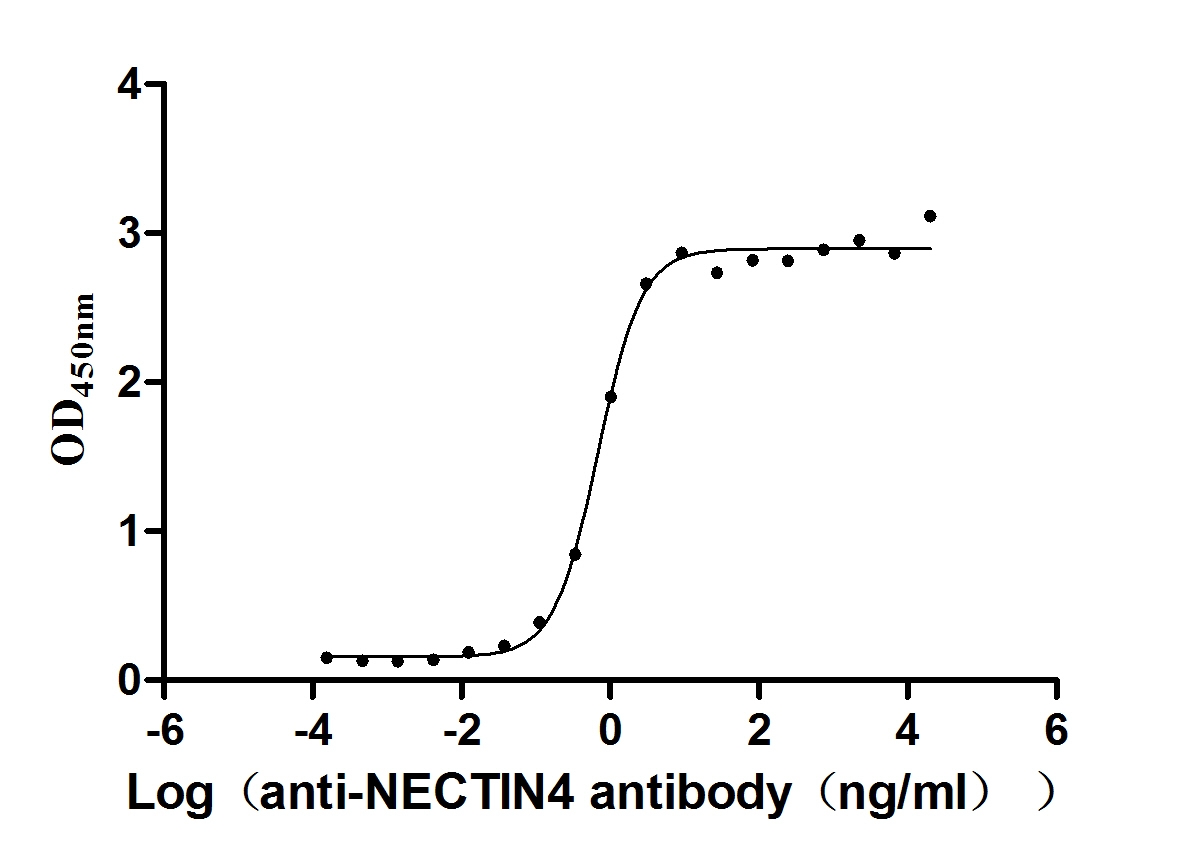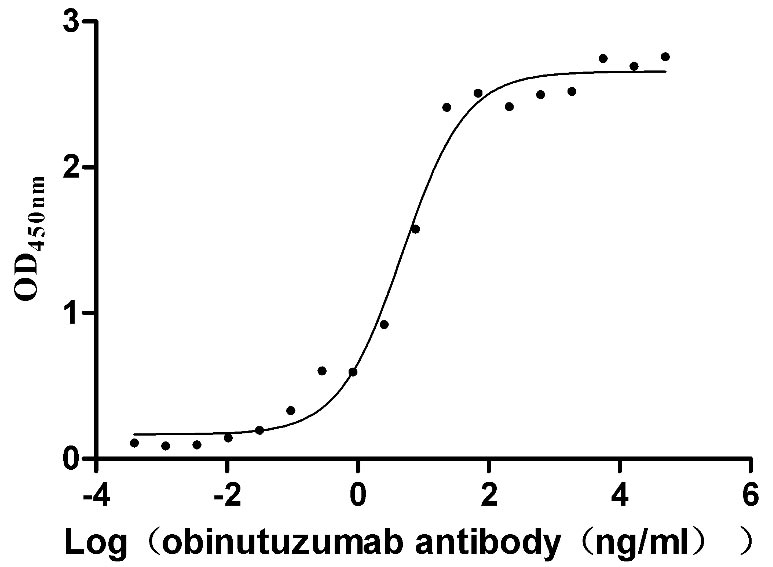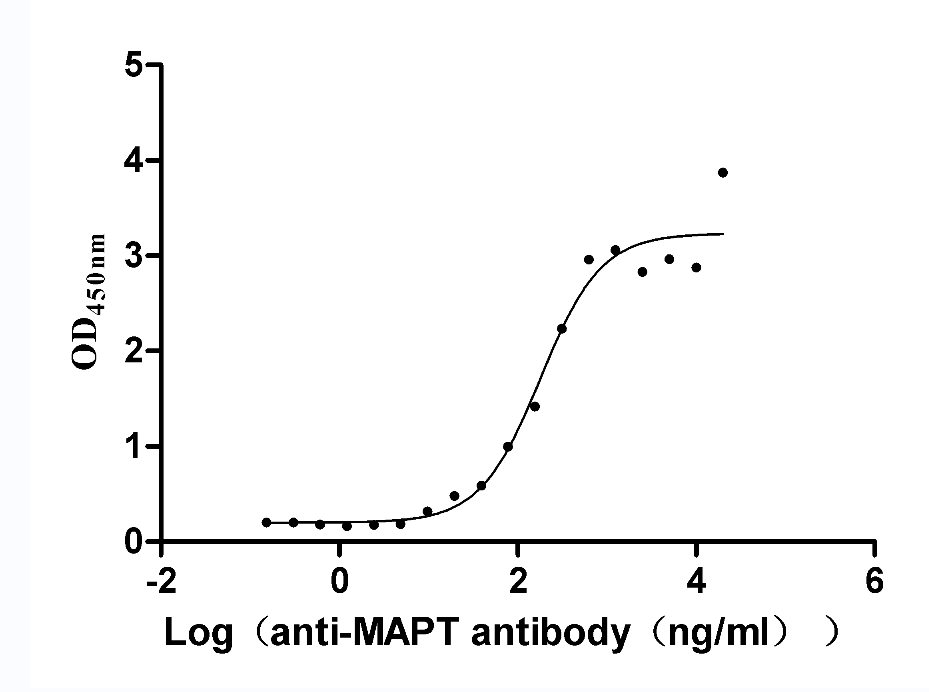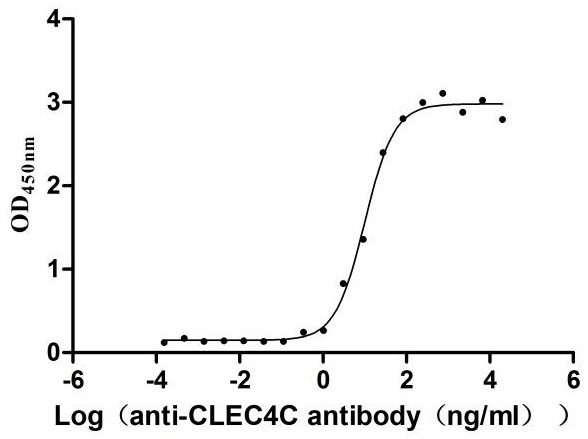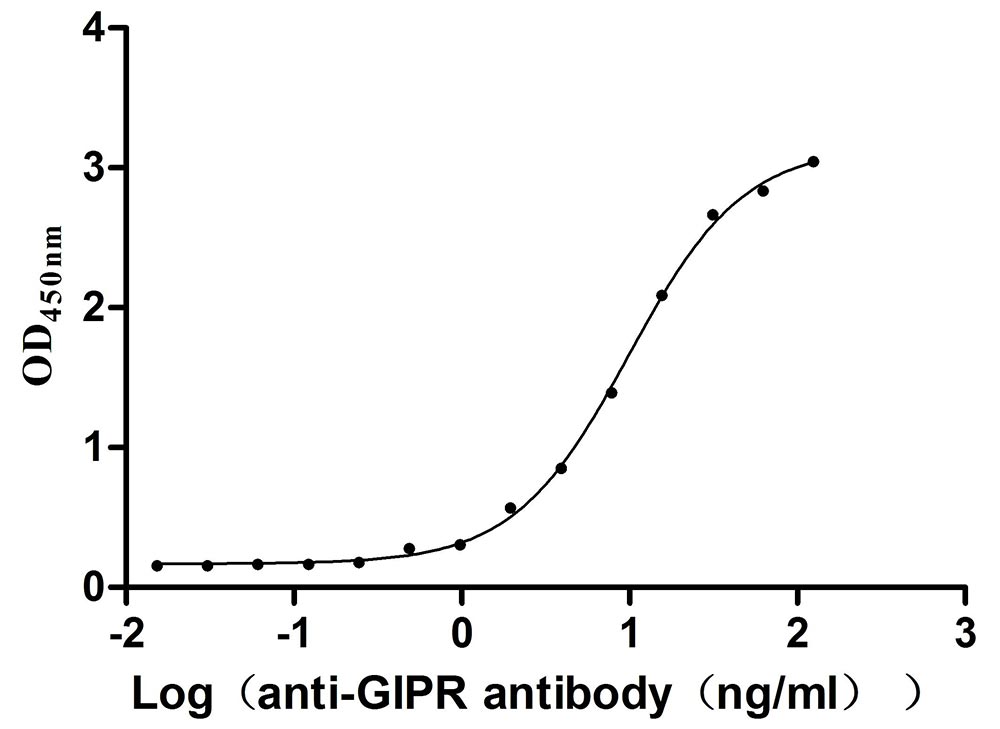Recombinant Mouse C5a anaphylatoxin chemotactic receptor C5L2 (Gpr77), partial
-
中文名稱:Recombinant Mouse C5a anaphylatoxin chemotactic receptor C5L2(Gpr77),partial,Yeast
-
貨號:CSB-YP805973MO1
-
規(guī)格:
-
來源:Yeast
-
其他:
-
中文名稱:Recombinant Mouse C5a anaphylatoxin chemotactic receptor C5L2(Gpr77),partial,Yeast
-
貨號:CSB-EP805973MO1
-
規(guī)格:
-
來源:E.coli
-
其他:
-
中文名稱:Recombinant Mouse C5a anaphylatoxin chemotactic receptor C5L2(Gpr77),partial,Yeast
-
貨號:CSB-EP805973MO1-B
-
規(guī)格:
-
來源:E.coli
-
共軛:Avi-tag Biotinylated
E. coli biotin ligase (BirA) is highly specific in covalently attaching biotin to the 15 amino acid AviTag peptide. This recombinant protein was biotinylated in vivo by AviTag-BirA technology, which method is BriA catalyzes amide linkage between the biotin and the specific lysine of the AviTag.
-
其他:
-
中文名稱:Recombinant Mouse C5a anaphylatoxin chemotactic receptor C5L2(Gpr77),partial,Yeast
-
貨號:CSB-BP805973MO1
-
規(guī)格:
-
來源:Baculovirus
-
其他:
-
中文名稱:Recombinant Mouse C5a anaphylatoxin chemotactic receptor C5L2(Gpr77),partial,Yeast
-
貨號:CSB-MP805973MO1
-
規(guī)格:
-
來源:Mammalian cell
-
其他:
產(chǎn)品詳情
-
純度:>85% (SDS-PAGE)
-
基因名:
-
Uniprot No.:
-
別名:C5ar2; C5l2; Gpr77; C5a anaphylatoxin chemotactic receptor 2; Complement component 5a receptor 2; G-protein coupled receptor 77
-
種屬:Mus musculus (Mouse)
-
蛋白長度:Partial
-
蛋白標簽:Tag?type?will?be?determined?during?the?manufacturing?process.
The tag type will be determined during production process. If you have specified tag type, please tell us and we will develop the specified tag preferentially. -
產(chǎn)品提供形式:Lyophilized powder
Note: We will preferentially ship the format that we have in stock, however, if you have any special requirement for the format, please remark your requirement when placing the order, we will prepare according to your demand. -
復溶:We recommend that this vial be briefly centrifuged prior to opening to bring the contents to the bottom. Please reconstitute protein in deionized sterile water to a concentration of 0.1-1.0 mg/mL.We recommend to add 5-50% of glycerol (final concentration) and aliquot for long-term storage at -20℃/-80℃. Our default final concentration of glycerol is 50%. Customers could use it as reference.
-
儲存條件:Store at -20°C/-80°C upon receipt, aliquoting is necessary for mutiple use. Avoid repeated freeze-thaw cycles.
-
保質(zhì)期:The shelf life is related to many factors, storage state, buffer ingredients, storage temperature and the stability of the protein itself.
Generally, the shelf life of liquid form is 6 months at -20°C/-80°C. The shelf life of lyophilized form is 12 months at -20°C/-80°C. -
貨期:Delivery time may differ from different purchasing way or location, please kindly consult your local distributors for specific delivery time.Note: All of our proteins are default shipped with normal blue ice packs, if you request to ship with dry ice, please communicate with us in advance and extra fees will be charged.
-
注意事項:Repeated freezing and thawing is not recommended. Store working aliquots at 4°C for up to one week.
-
Datasheet :Please contact us to get it.
相關(guān)產(chǎn)品
靶點詳情
-
功能:Receptor for the chemotactic and inflammatory C3a, C4a and C5a anaphylatoxin peptides and also for their dearginated forms ASP/C3adesArg, C4adesArg and C5adesArg respectively. Couples weakly to G(i)-mediated signaling pathways.
-
基因功能參考文獻:
- Development of burn-induced mechanical allodynia, thermal allodynia, weight bearing changes and edema was assessed in C3aR(-/-), C5aR1(-/-) and C5aR2(-/-) mice and compared to their wild type controls over three days. Burn-induced mechanical allodynia, thermal allodynia and weight bearing changes developed normally C3aR(-/-), C5aR1(-/-) and C5aR2(-/-) mice. PMID: 29274925
- Loss of C5aR2 worsens the outcome from spinal cord injury in mice. PMID: 28173736
- a detailed map of murine C5aR2 immune cell expression in different tissues under steady-state conditions and upon pulmonary inflammation. PMID: 28864475
- The role of C5aR1 and C5aR2 in response to renal ischemia-reperfusion injury is reported. The results also demonstrated that C5aR2 is a functional receptor, rather than a decoy receptor, and may provide a new target for intervention. PMID: 28396344
- C5L2 plays an important antiinflammatory role. PMID: 27285858
- C5ar2 deficiency attenuates atherosclerosis and neointimal plaque formation after arterial injury. PMID: 26084965
- Findings demonstrate that, under excitotoxicity, Fosb products contribute to a neuroinflammatory response in the hippocampus through regulation of microglial C5ar1 and C5ar2 expression PMID: 24771617
- This work reveals an essential role for C5L2 in C5a-triggered, AP2-dependent C5aR internalization and downstream ERK signaling. PMID: 24631530
- Mouse susceptibility to MHV-3-induced fulminant hepatitis may rely on C5a/C5aR interactions, for which ERK1/2 and p38 pathways participate in up-regulating Fgl2 expression. PMID: 24604562
- These observations indicate the importance of C5aR in adipose tissue metabolism and immunity, which may be regulated through heterodimerization with C5L2. PMID: 24397921
- in allergic contact sensitivity, as in isolated human neutrophils, C5L2 functions to suppress C5a-C5aR-mediated responses, further underscoring its role as a negative regulator of anaphylatoxin activity. PMID: 24043888
- Disruption of C5L2 increases macrophage presence in white adipose tissue, contributing to obesity-associated pathologies. PMID: 23630572
- C5L2 is a functional receptor for ASP and act as a decoy receptor for C5a in pathophysiological conditions. PMID: 23268185
- These findings elucidate the functional characteristics of the C5L2 receptor during the acute inflammatory response. PMID: 23575697
- The results suggest that insulin sensitivity may be permissive for coupling of C5L2 levels to lipid storage and utilization. PMID: 23460866
- genetic deficiency enhances the development of diet-induced insulin resistance PMID: 22622332
- C5a suppresses IL-27(p28) in lipopolysaccharide-stimulated peritoneal macrophages via interactions with the C5aR receptor rather than the C5L2 receptor. PMID: 22491257
- C5L2 acts at the myeloid dendritic cell/T cell interface to control the development of T helper (Th)1 and Th17 cells in response to airway house dust mite exposure and may have a complex role in the development of experimental allergic asthma. PMID: 20974988
- data provide the first evidence for a role for C5a receptor C5L2 in balancing the biological responses to Complement 5a PMID: 15784721
- the complement anaphylatoxin C5a-binding protein, C5L2 (GPR77) has an anti-inflammatory role PMID: 16204243
- C5L2 appears to bind complement factor C5a and C5a des Arg by different mechanisms, and, unlike C5a receptor (C5aR), C5L2 uses critical residues in its N-terminal domain for binding only to C5a des Arg. PMID: 17158873
- data indicate that C5L2 can function as a positive modulator for both C5a- and C3a-anaphylatoxin-induced responses PMID: 17322907
- C5L2 mRNA increases with differentiation, insulin, and thiazolidinedione treatment, and decreases with tumor necrosis factor alpha, all of which results in functional changes in ASP-C5L2 response and may have implications for human metabolism. PMID: 17464341
- Fatty acid-induced ASP resistance via C5L2 may contribute to altered adipose tissue function and obesity/insulin resistance phenotype PMID: 18004729
- C5l2 is required for the release of HMGB1, is a functional receptor and contributes synergistically with C5ar to the harmful consequences in sepsis. PMID: 18454156
- C5L2 and ASP expression following treatment with sex steroid hormones in adipocytes and in preadipocytes PMID: 18615583
- Recombinant C3adesArg/acylation stimulating protein (ASP) is highly bioactive: a critical evaluation of C5L2 binding and 3T3-L1 adipocyte activation. PMID: 19767107
顯示更多
收起更多
-
亞細胞定位:Cell membrane; Multi-pass membrane protein.
-
蛋白家族:G-protein coupled receptor 1 family
-
組織特異性:Highly expressed in liver and spleen. Lower levels in intestine, brain and kidney. Also expressed in adipose tissues with highest levels in gonadal and ingual fat depots. Lower levels in brown tissue.
-
數(shù)據(jù)庫鏈接:
Most popular with customers
-
Recombinant Human Plexin-B1 (PLXNB1), partial (Active)
Express system: Mammalian cell
Species: Homo sapiens (Human)
-
Recombinant Human Nectin-4 (NECTIN4), partial (Active)
Express system: Mammalian cell
Species: Homo sapiens (Human)
-
Recombinant Human B-lymphocyte antigen CD20 (MS4A1)-VLPs (Active)
Express system: Mammalian cell
Species: Homo sapiens (Human)
-
Recombinant Rat Microtubule-associated protein tau (Mapt) (Active)
Express system: Mammalian cell
Species: Rattus norvegicus (Rat)
-
Recombinant Dog B-lymphocyte antigen CD20 (MS4A1)-VLPs (Active)
Express system: Mammalian cell
Species: Canis lupus familiaris (Dog) (Canis familiaris)
-
Recombinant Mouse Cell adhesion molecule 1 (Cadm1), partial (Active)
Express system: Mammalian cell
Species: Mus musculus (Mouse)
-
Recombinant Human C-type lectin domain family 4 member C (CLEC4C), partial (Active)
Express system: Mammalian cell
Species: Homo sapiens (Human)
-
Recombinant Mouse Gastric inhibitory polypeptide receptor (Gipr), partial (Active)
Express system: Mammalian cell
Species: Mus musculus (Mouse)



